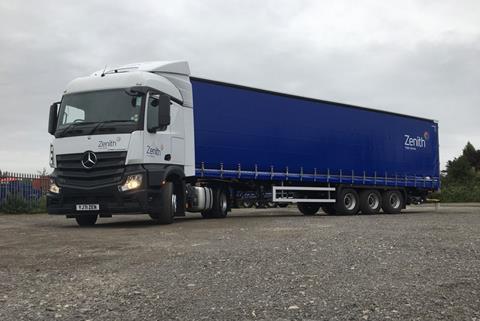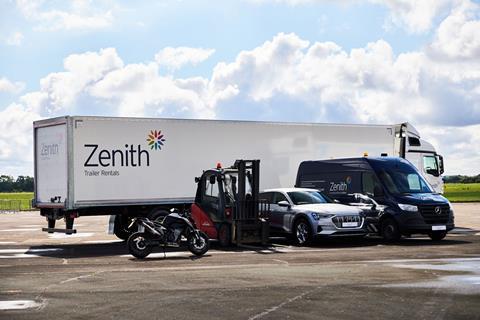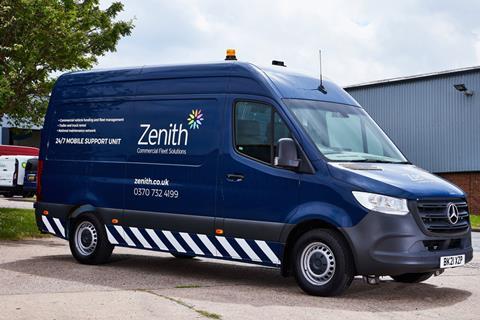2024 looks challenging but will present opportunities for vehicle …

Headquartered in Leeds, Zenith was acquired by private equity company Bridgepoint in February 2017 and immediately entered the commercial vehicle market by acquiring CVL to create a car to HGV, one-stop-shop mobility provider.
In the six months to 30 September 2023 group turnover rose 21% year on year to £386m though EBITDA fell 13% to £34m as operating expenses grew almost 13% to £36.6m, driven primarily by price inflation and investment to support future growth.
The Commercial division offers fleet management services, maintenance, and funding solutions for LCVs, HGVs and specialist vehicles and Zenith is the UK’s largest operator in large commercial vehicle management and trailer rental with 50,000 predominantly HGV assets under management, of which 17,500 are also funded.
The Corporate division offers fully outsourced company car and light van schemes focused on customers with fleets of more than 100 vehicles while the Consumer division is made up of personal car leasing brand ZenAuto and White Label Solutions which provides business process outsourcing and back-office services for the finance arms of leading automotive manufacturing and consumer finance businesses.
Zenith CEO Tim Buchan has announced his intention to retire at the end of 2024 to become a non-executive director on the group holding board. Zenith have also announced that the Corporate and Consumer divisions will be brought together and led by Ian Hughes, currently CEO of the Corporate division.

Martin Jenkins, pictured, remains in his role as CEO of the Commercial division which continues to grow its fleet management portfolio through new customer wins including Travis Perkins and Wales & West Utilities, totalling 5,000 units. He also holds the group strategy director role.
Zenith Commercial manages almost 30,000 trucks and trailers and 13,000 larger and specialist vans run by fleet operators, and has another 7,000 trailers in its rental fleet.
The truck fleet reflects the UK average vehicle parc, being split around 70/30 rigids/artics, and while Zenith doesn’t focus on any particular sector of the road transport market most of its customers run larger fleets.
“We provide a wide range of solutions to many different customers with varying fleet sizes and usages,” says Jenkins. “We look for customers who share common values and culture. It’s all about partnership and collaboration for the long term. We do have some smaller fleets where there is a strong match of our solution to the customer need.”
With trailer spot hire in particular Zenith quickly sees a “bellwether” on the state of the UK economy and how that affects different sectors of the transport industry; in its Q2 results the company said trailer utilisation had softened “reflecting weaker consumer demand affecting logistics and parcel volumes”.
While there have been concerns about the pre-Christmas peak being flatter than usual for some operators, Zenith did see trailer rental demand increase in the final quarter of calendar 2023.
Jenkins says that some of the markets Zenith serves will continue to be “challenging” in 2024 but, as often happens in down turns, uncertainty can lead to growth in vehicle leasing and rental as operators struggle to fund fleet renewals.
“We straddle just about every sector of the economy and a number of our customers are not immune,” he says. “Overall we are seeing growth in demand for both funding and fleet management solutions, which reflects UK HGV sales where SMMT has reported six consecutive quarters of growth and is now only just short of the 2019 market.
“Operators are looking very carefully at the efficiency of their own operations. Outsourced solutions, that benefit from the increased investment and expertise that comes with the scale that companies like us can provide, are increasingly in demand.
“A number of our new customer wins have come from inhouse solutions moving towards a collaborative partnership approach with an outsourced provider as opposed to us winning a contract from a competitor.”
Zenith Commercial’s total fleet grew 3% in H1 of its current financial year which ends on 31 March 2024 and the two recent contract wins totalling 5,000 units will contribute to further growth in H2. This is in line with the UK HGV market where new registrations are forecasted by SMMT to be more than 20% higher in 2023 than the previous year.
“We are looking at posting further growth in our total fleet,” says Jenkins. “A large part of that is managed rather than funded and I would expect growth in the funded fleet to lag a little as we are selective about the assets we fund.
“If you look at the trends in new vehicle registrations, that shows there is growth to be had. We are probably taking market share in the managed market and are growing nicely in the funded market.”
Zenith will not be held back by any lack of financial muscle, with nearly £1bn in proprietary securitised funding facilities and a range of other funding sources. With many fleet customers seeing low or no growth in volumes, and cost inflation eating into margins, contract extensions are however back on the agenda.
“That has been the case for a little while,” says Jenkins. “It is starting to come off a little as we are seeing supply chains ease and new vehicle availability improve. But there is a significant proportion of fleets which are extended and I don’t see that changing dramatically any time soon.
“That is not just about new vehicle availability, it is also about the transition to decarbonisation and the dramatic increase in the capital cost of new vehicles.
“We are major purchasers of trucks and trailers in our own right and while supply chains are not back to where they were before Covid, they have eased considerably.”
While there have been some notable withdrawals from the leasing and contract hire market in recent years, it remains fiercely competitive and passing on higher capital costs to cash-strapped customers is difficult.
“The capital cost is just one component of the whole life cost,” says Jenkins. “In the commercial market, we see ourselves first and foremost as a fleet management company. We absolutely do provide funding solutions but our proposition to customers addresses the largest element of cost, which is the in-life experience around availability, maintenance and compliance. It is also about helping our customers optimise their fleets through improved performance.
“When you see the inflation in labour rates and parts over the last two years there has never been a greater need for expert management. So we are not simply competing just on a rental rate.”

Another key component in pricing a vehicle lease is the expected residual value, and as the industry moves inexorably closer to the end of sale dates for new diesel trucks (2035 and 2040) at some point the RVs on Euro-6 trucks will begin to reflect either the desire to run with diesel as long as possible or the phasing out of an old technology in favour of the brave new electric world.
“Are we seeing a major movement in diesel RVs that would be indicative of a fundamental structural change in the market – no,” says Jenkins. “The question of RVs around zero-emission vehicles is a whole different issue. That will be a very significant change but it is a tiny proportion of the market at the moment.
“They are still less than 1% of new vehicle registrations and outside urban and municipal fleets, in the core customer base that we serve, it doesn’t go beyond the odd demonstrator. Those RVs are typically supported by the manufacturer - or the customer makes an investment decision for themselves to take the risk and write it down to zero over the life of the asset.
“Nobody is taking a position because we can’t at the moment. Everyone knows those costs will have to fall dramatically over the product development horizon we are stepping into now.”
The government remains adamant that, other than the existing £30,000 plug-in truck grant, it is not willing to subsidise the transition to zero-emission vehicles but Jenkins says there are things the DfT can do to make the direction of travel clearer.
“This is a transition we have to go through and we are all waiting with bated breath for the government to publish its low carbon fuels strategy which seemingly is now going to be in early 2024,” he says. “That is important. But the most fundamental issues for HGVs are the prohibitive capital cost of the vehicles and the lack of appropriate refuelling and recharging infrastructure.
“The government has just closed its consultation on this and they will publish in 2024 a strategy for HGVs. That will be a critical milestone that will have to clarify the respective roles of government and industry in executing whatever strategy they articulate from that consultation.
“We need a really clear roadmap which sets out precisely how that infrastructure is going to be delivered and I hope there won’t be the delay there has been in the low carbon fuels strategy because we can’t afford it.”
Jenkins firmly believes that despite their cost disadvantage low carbon fuels must play a part in the shift away from fossil fuels.
“An HGV operator with a fleet of any size is still focused on a diesel powertrain strategy and very significant investment is going into diesel assets which you would expect to have a lifespan of seven to 12 years,” he says. “The role of alternative fuels is going to be vitally important, certainly for the transition, and the interesting question which the government is going to have to address is ‘will they have a role beyond transition?’
“We have a number of customers who have embraced it strongly because they have decided to take a position and go early. There is more interest in the whole question of sustainability than there has ever been before so the pressure is there.”
The scale of the challenge to decarbonise road freight transport remains immense, and the recent BVRLA annual conference warned that the leasing sector is under-prepared for the major role the vehicle OEMs expect it to perform when it comes to funding zero-emission commercial vehicles.
“HGVs are 15 years or more behind cars and yet for vehicles under 26 tonnes we are facing precisely the same cliff edge in 2035,” says Jenkins. “There is a hell of a lot to do in the next nine years.”
Jenkins is cautious about joining the sometimes heated debate about whether hydrogen will have a role in decarbonising road freight but offers a personal opinion.
“I think battery electric will be centre stage for the majority of commercial movements,” he says. “The product and battery technology development and the broader momentum around charging infrastructure - albeit still very car and light van centric – means it will have a very significant role.
“But for certain vehicle types and usages where you need a longer range, and where it is possible to have a network of refuelling opportunities that cover a meaningful proportion of those trunk legs, hydrogen will probably have a part to play.”
Will full expensing affect the value of asset leasing over purchase?
In the autumn statement made in November 2023, the government announced that full expensing - a 100% first-year allowance for main rate expenditure on plant and machinery – would be made permanent rather than ending as originally planned on 1 April 2026.
The full impact of this measure has yet to be calculated as the technical details on exactly what type of assets will be covered remain unclear.
“My understanding is that this will not benefit leasing companies,” says Jenkins. “That is still under discussion and the Treasury has indicated that they will take submissions and look at it. This is an area that is evolving as the policy becomes clearer but any support the government can provide to encourage investment in the latest, greenest technology has to be welcomed.”
A blended approach to commercial vehicle R&M
Zenith uses a blend of third party and inhouse vehicle maintenance units to look after its 37,000 trucks and trailers and 13,000 vans.

“Our direct delivery capability is across two areas,” says Jenkins. “We have four strategically located workshops of our own, three of which are specialist trailer workshops.
“Where we have been investing significantly is in our mobile service units, which we have grown by more than 50% over the past two years to now stand at 90. That is in response to an opportunity to help customers reduce their overall emissions by deploying HGV or LCV mobile solutions on customer sites.”
There are significant benefits in doing as much R&M as possible on site, including reduced mileage to and from a remote workshop and improved vehicle availability.
“Our strategy is evolving to meet the needs of customers,” Jenkins says. “But the network of Zenith approved repairers will always be an essential core of what we provide, which is a fully national solution that meets the wide range of vehicle types and geographic footprint of the 50,000 vehicles we manage.”
The proportion of R&M that can be done by a mobile technician is always increasing and Zenith now does the majority of trailer maintenance – including laden roller brake testing - on customer sites.
“What can’t be done on a customer site is an MoT or anything that requires heavy repair work,” says Jenkins. “But we think there is a significant opportunity to move to mobile solutions.”
Shortages of technicians have become more acute than drivers of late and Zenith has introduced an apprenticeship scheme to grow its own workforce.
“This is an industry-wide challenge and we are not immune to those market pressures,” says Jenkins. “Our experience of recruiting mobile technicians has been pretty successful and we are generally able to meet our recruitment targets. Filling workshop technician vacancies is proving to be more challenging. We do fill them but it is hard work.”